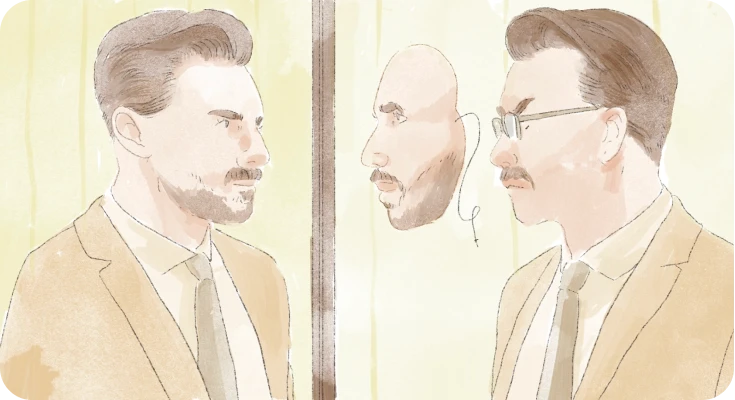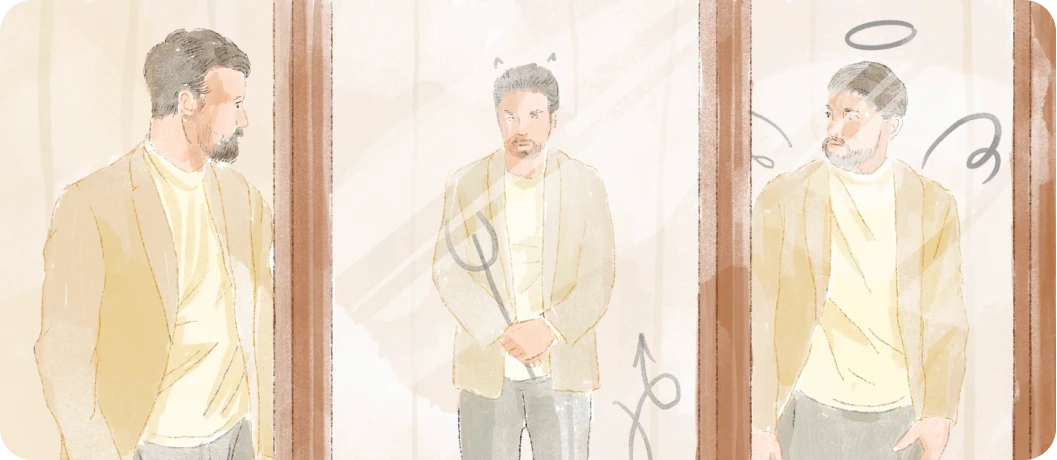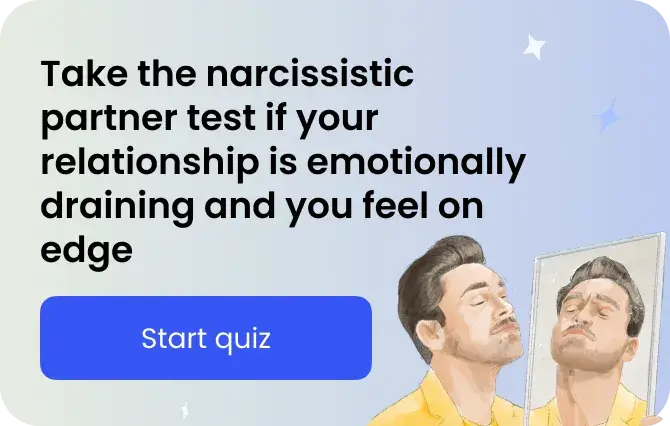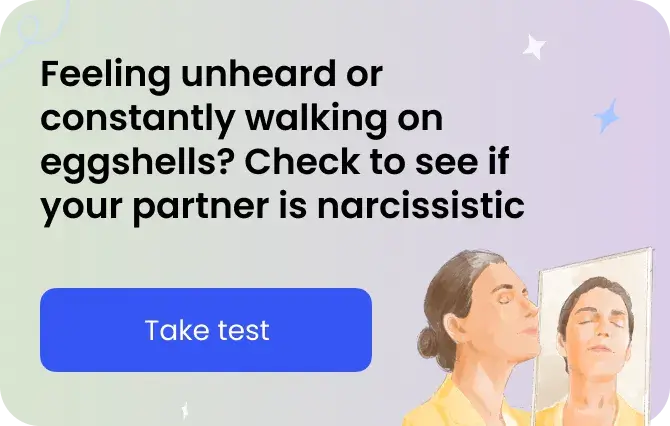Podcast name
Covert narcissist test
Narcissism isn’t always flashy and loud. Sometimes, it hides behind a mask of humility and shyness.
Covert narcissists’ traits can be harder to detect than those of an overt narcissist because they might appear humble and shy. Deep down, though, they have fragile self-esteem, are highly sensitive to criticism, and have a limited or lack of empathy.
Therefore, how can I figure out if I am a covert narcissist? The covert narcissist test can reveal how these behaviors affect the person and others.
First, take a look to see if it’s not you but actually your partner who can be a narcissist.
Take the covert narcissist test
To help you identify covert narcissism, we’ve created a 15-question quiz.
Here is what you need to do:
- Find a quiet spot where you can be by yourself with your thoughts.
- Read each statement and choose agree or disagree, or if you are not sure — neutral.
- Answer each question honestly, based on your experiences or observations of yourself.
- There are no right or wrong answers as the goal is self-reflection.
- Don’t overanalyze or overthink. Just trust your initial gut feeling when answering the vulnerable narcissism quiz.
Take the quiz
1. I often feel undervalued or underappreciated, no matter how successful I am.
- Agree
- Neutral
- Disagree
2. Whenever I do not get the recognition and appreciation I believe I am due, I tend to feel down or very insecure.
- Agree
- Neutral
- Disagree
3. I dislike sharing the credit of achievement with others
- Agree
- Neutral
- Disagree
4. I often fear that other people are negatively judging me
- Agree
- Neutral
- Disagree
5. When I see someone who is attractive or who has achieved success, I feel envious
- Agree
- Neutral
- Disagree
6. Even if I am connected to others, I often feel like an outsider when I’m in a group of people
- Agree
- Neutral
- Disagree
7. I am highly sensitive to criticism or perceived slights, even if they are minor
- Agree
- Neutral
- Disagree
8. After arguments, I often hold grudges for a long time
- Agree
- Neutral
- Disagree
9. I tend to downplay others’ accomplishments or subtly undermine them
- Agree
- Neutral
- Disagree
10. I frequently feel a sense of entitlement to get what I really want, even if I do not vocalize it
- Agree
- Neutral
- Disagree
11. I have had a hard time making deep, real connections with other people
- Agree
- Neutral
- Disagree
12. Most of the time, I withdraw or sulk when I feel criticized or unappreciated
- Agree
- Neutral
- Disagree
13. It is very hard to accept making mistakes or hold myself accountable when I do something wrong
- Agree
- Neutral
- Disagree
14. I find myself feeling superior to others, even if I don’t openly express it
- Agree
- Neutral
- Disagree
15. Oher people are either great or terrible, and it’s hard to find the nuance that exists in the middle
- Agree
- Neutral
- Disagree
Scoring and interpreting your results
To interpret your results, count the number of your “agree” responses.
0-5 Agree Answers
If you got a score between 0 and 5 “agree” answers, you probably do not have many or any covert narcissistic traits.
Anyway, there is always room for self-improvement. You can focus on fostering genuine empathy and open communication with others. Additionally, notice and value the good qualities in the people around you.
6-10 Agree Answers
A moderate score suggests that while you might have some narcissistic traits, they do not dominate your personality. You might have trouble taking criticism or not feeling appreciated enough, which can make relationships difficult or lead to miscommunications.
11-15 Agree Answers
You likely exhibit traits of covert narcissism. Your relationships with other people, how you see yourself, and your overall happiness can all be affected by these traits.
Also, you may often feel alone, overly concerned with how other people see you, and have deep-seated feelings of not being good enough.
Discovering that you might have traits of covert narcissism can be both confusing and distressing. But remember, you’re not alone, and there are steps you can take to improve your self-awareness and relationships.
Recommendations
- Self-Reflection: Reflect on the areas where you scored high. Consider how these traits may be impacting your relationships and overall well-being.
- Get to Know Yourself: Focus on developing empathy and improving your communication skills. Practice self-awareness and mindfulness to better understand your emotions and reactions.
- Seek Professional Help: If you find that you have significant covert narcissistic tendencies, consider seeking help from a mental health professional. Therapy can provide valuable tools and strategies for managing these traits.

FAQ on covert narcissist test
If I’m not sure whether I’m a covert narcissist or not, can I take this quiz?
Yes, definitely. The purpose of the test is to provide information and self-reflection. It’s designed to help you understand potential narcissist traits in yourself.
Can I trust the covert narcissist quiz?
This test is not a substitute for professional diagnosis or treatment. If you have concerns about covert narcissism, consider reaching out to a mental health professional for further evaluation and support.
What are the origins of the Maladaptive Covert Narcissism Scale?
The Maladaptive Covert Narcissism Scale was developed as a response to the need for a more nuanced understanding of narcissistic traits. Traditionally, tests for narcissism mostly looked at overt traits like grandiosity and vanity, neglecting to examine less obvious signs of narcissism.
Dr. Craig Malkin, a renowned clinical psychologist, significantly contributed to the development of this concept. His work highlighted the need for a tool to effectively measure these subtler traits.
What’s covert narcissism?
Covert narcissism, also known as vulnerable narcissism, is considered a sub-type of narcissistic personality disorder (NPD). Unlike their overt counterparts, covert narcissists are less obvious in their behavior. They often present themselves as shy or introverted, making it harder to detect their narcissistic tendencies.
Which traits do covert narcissists have in common?
- Heightened sensitivity to criticism
- A tendency toward passive aggression
- Envy and desire for recognition
- Preference for indirect validation
- A subtle expression of entitlement
- Loneliness and feelings of inadequacy
- The outward appearance of humility or shyness
So, can covert narcissists change over time?
“Yes, people with covert narcissism can change. It’s important to prioritize building a healthy concept of self-image. It’s equally important to focus on forming genuine, high-quality relationships with people who have firm boundaries. This helps you enjoy connection and practice healthier interpersonal habits. Therapy can also address the underlying trauma that often perpetuates narcissistic patterns.” — says Nicole Arzt, Licensed Marriage Family Therapist (LMFT)
Disclaimer
This article is for general informative and self-discovery purposes only. It should not replace expert guidance from professionals.
Any action you take in response to the information in this article, whether directly or indirectly, is solely your responsibility and is done at your own risk. Breeze content team and its mental health experts disclaim any liability, loss, or risk, personal, professional, or otherwise, which may result from the use and/or application of any content.
Always consult your doctor or other certified health practitioner with any medical questions or concerns
Breeze articles exclusively cite trusted sources, such as academic research institutions and medical associations, including research and studies from PubMed, ResearchGate, or similar databases. Examine our subject-matter editors and editorial process to see how we verify facts and maintain the accuracy, reliability, and trustworthiness of our material.
Was this article helpful?





